Iran crowns trio of U20 world champs, wins team title
Sunday, August 21, 2022 - 21:57 By Vinay Siwach

SOFIA, Bulgaria (August 21) -- When Alireza MOHMADIPIANI (IRI) was in Bulgaria last time, he was wrestling at his first senior tournament at the Dan Kolov in Sofia. Mohmadipiani finished with a bronze medal after losing the semifinal to European silver medalist Gela BOLKVADZE (GEO) in the semifinal.
Despite the loss, Mohmadipiani took home a lesson from the loss of being on the attack from the word go in a bout.
He used a similar strategy in the 82kg final against '21 U17 world champion Achiko BOLKVADZE (GEO) to win the gold medal at the U20 World Championships in Sofia.
Mohmadipiani was one of the three gold medalists for Iran on Sunday as the latest edition of the U20 World Championships came to an end with Iran winning the Greco-Roman title with 174 points. Azerbaijan finished second with 119 points while Ukraine managed to jump to third with 93 points.
The two other gold medals on Sunday were captured by wrestlers from Azerbaijan. A historic bronze medal was also won by Richard KARELSON (EST), becoming the first-ever medalist from the country at U20 Worlds.
For Iran, Mohmadipiani had the most convincing victory even though he faced one of the most accomplished wrestlers entered in the competition.
18-year-old Bolkvadze began aggressively against Mohmadipiani but lost some steam as the bout went on. He was called passive and Mohmadipiani failed to get a turn. But 20 seconds later, Mohmadipiani got him into a body lock and pushed him to the mat to get four points.
In the second period, Bolkvadze got the opportunity to level scores but he failed to get any points from par terre.
Bolkvadze struggled to keep up with the pace of the bout and the referee warned him for blocking. On the second warning, he was cautioned with two points. Mohmadipiani got the win when Bolkvadze received his second caution and two points.
"Bolkvadze is a good wrestler and he won a gold medal last year [at U17," Mohmadipiani said. "I won the Asian Championships. So great bout but I won against him at the end."
With the U20 title in the bag, the Iran youngster is hoping to quickly move to seniors from next year onwards. But he knows the challenge that comes with it.
"The weight class has many good wrestlers," he said. "We have Azerbaijan [Rafig HUSEYNOV] and Turkey [Burhan AKBUDAK] but I'm well trained and I think I can win.”
 Saeid ESMAEILI (IRI) defeated Suren AGHAJANYAN (ARM) in the 60kg final. (Photo: UWW / Kostadin Andonov)
Saeid ESMAEILI (IRI) defeated Suren AGHAJANYAN (ARM) in the 60kg final. (Photo: UWW / Kostadin Andonov)
At 60kg, Saeid ESMAEILI (IRI) had all but lost the gold to Suren AGHAJANYAN (ARM) as he trailed 6-2 with 22 seconds left in the final. But Esmaeili got his hands around Aghajanyan’s waist before moving into a bearhug and he secured a four-point throw to win 6-6.
Aghajanyan scored exposure from par terre to lead 3-2 before Esmaeili scored a takedown on the edge just before the break.
In the second period, Esmaeili worked more but there was no passivity call as Aghajanyan scored two stepouts to lead 5-2.
Esmaeili tried going for a takedown but his hands moved below the Aghajanyan’s waist and the move was illegal. Iran challenged the call but lost. It seemed that the final was all locked up when the U20 Asian champion stunned Aghajanyan, and the crowd with the throw to take the criteria lead.
 Ali ABEDIDARZI (IRI) scored six stepout points against Iussuf MATSIYEV (KAZ) in the 97kg final. (Photo: UWW / Kostadin Andonov)
Ali ABEDIDARZI (IRI) scored six stepout points against Iussuf MATSIYEV (KAZ) in the 97kg final. (Photo: UWW / Kostadin Andonov)
The third gold medal for Iran came in emphatic fashion as Ali ABEDIDARZI (IRI) won the 97kg weight class over Iussuf MATSIYEV (KAZ).
Matsiyev took a 4-0 lead with a stepout and turn from par terre and Abedidarzi was struggling to get going with his attacks. But just before the break, he scored two stepouts and Matsiyev was hit with caution for fleeing.
Abedidarzi scored three more stepouts in the second period to claim the lead 5-4. When Matsiyev was called passive, Abedidarzi continued the bout from standing and scored three points to win 9-4.
 Kanan ABDULLAZADE (AZE) won the gold at 67kg after beating Nika BROLADZE (GEO). (Photo: UWW / Kostadin Andonov)
Kanan ABDULLAZADE (AZE) won the gold at 67kg after beating Nika BROLADZE (GEO). (Photo: UWW / Kostadin Andonov)
Azerbaijan won the remaining two gold medals as Kanan ABDULLAZADE (AZE) won the 67kg weight class while Gurban GURBANOV (AZE) won at 72kg.
Abdullazade wrestled Nika BROLADZE (GEO) in the final and fell when the latter took the 1-1 criteria lead. Broladze planned to keep the lead until the end of the six minutes but Abdullazade scored a stepout with a minute and 13 seconds left.
Broladze, with time running out, tried to throw Abdullazade but both wrestlers fell with no control. But in the same sequence, Abdulladze managed to run around and score a go-behind to extend his lead to 4-1 for the win.
 Gurban GURBANOV (AZE) celebrates after emerging as the champion at 72kg. (Photo: UWW / Kostadin Andonov)
Gurban GURBANOV (AZE) celebrates after emerging as the champion at 72kg. (Photo: UWW / Kostadin Andonov)
Gurbanov had a similar script for his final as he defeated Alexandru SOLOVEI (MDA), 4-0, in the 72kg final. Perhaps he did not plan to get the first passivity point but Solovei was called passive and forced into par terre.
The former U17 world champion got the turn using a gut wrench to lead 3-0 at the break. He then continued to wrestle aggressively in the second period and Solovei was again called passive. This time Gurbanov did not get the turn but the score read 4-0.
Solovei got his chance to score when the third passivity was called against Gurbanov but Solovei had nothing left in him to turn the Azerbaijan wrestler.
 Richard KARELSON (EST), blue, won Estonia's first-ever medal at U20 World Championships. (Photo: UWW / Kostadin Andonov)
Richard KARELSON (EST), blue, won Estonia's first-ever medal at U20 World Championships. (Photo: UWW / Kostadin Andonov)
Estonia’s historic medal
No Estonia Greco-Roman wrestler even won a medal at the U20 Worlds but Richard KARELSON (EST) changed that on Sunday as he won a bronze medal in the 97kg weight class after beating Roman BALCHIVSCHII (MDA), 8-0, in the bronze medal bout.
In June, Karelson had become the first U20 European champion from Estonia in Greco-Roman. He was the second ever Estonian Greco-Roman wrestler to enter the final.
Incidentally, his father is also named Richard.
“It’s a great feeling,” Karelson said. “I hope I can work on this and win at the U23 Worlds as well. I know that the competition will be harder than this.
Karelson's father was the one who forced his son into wrestling after he was growing too fast.
In the previous two U20 Worlds, Karelson had finished 15th in Ufa and 12th in Tallin, his hometown. But with the bronze medal in Sofia, Karelson hopes he can lift his performance moving forward.
"The U20 European gold and this bronze medal will help me get some funds," he said. "Now I hope to continue this performance and train more."
With the U17 and U20 behind, the action now moves on to the World Championships in Belgrade, Serbia in two weeks.
 Iran won the Greco-Roman team title at the U20 World Championships. (Photo: UWW / Kostadin Andonov)
Iran won the Greco-Roman team title at the U20 World Championships. (Photo: UWW / Kostadin Andonov)
RESULTS
60kg
GOLD: Saeid ESMAEILI (IRI) df. Suren AGHAJANYAN (ARM), 6-6
BRONZE: Nihat MAMMADLI (AZE) df. Koto GOMI (JPN), 3-3
BRONZE: SUMIT (IND) df. Mert ILBARS (TUR), 6-3
67kg
GOLD: Kanan ABDULLAZADE (AZE) df. Nika BROLADZE (GEO), 4-1
BRONZE: Din KOSHKAR (KAZ) df. Onur YURTADA (TUR), 3-2
BRONZE: Seyed SOHRABI (IRI) df. Nestori MANNILA (FIN), 11-2
72kg
GOLD: Gurban GURBANOV (AZE) df. Alexandru SOLOVEI (MDA), 4-0
BRONZE: Irfan MIRZOIEV (UKR) df. Igor BOTEZ (ROU), 7-6
BRONZE: Amir ABDI (IRI) df. Merey MAULITKANOV (KAZ), 4-0
82kg
GOLD: Alireza MOHMADIPIANI (IRI) df. Achiko BOLKVADZE (GEO), 9-1
BRONZE: Rohit DAHIYA (IND) df. Ruslan ABDIIEV (UKR), 8-7 (via cautions)
BRONZE: Alperen BERBER (TUR) df. Fares GHALY (EGY), 9-1
97kg
GOLD: Ali ABEDIDARZI (IRI) df. Iussuf MATSIYEV (KAZ), 9-4
BRONZE: Richard KARELSON (EST) df. Roman BALCHIVSCHII (MDA), 8-0
BRONZE: Nurmanbet RAIMALY UULU (KGZ) df. Luka KATIC (SRB), 9-0


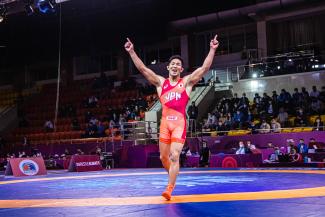
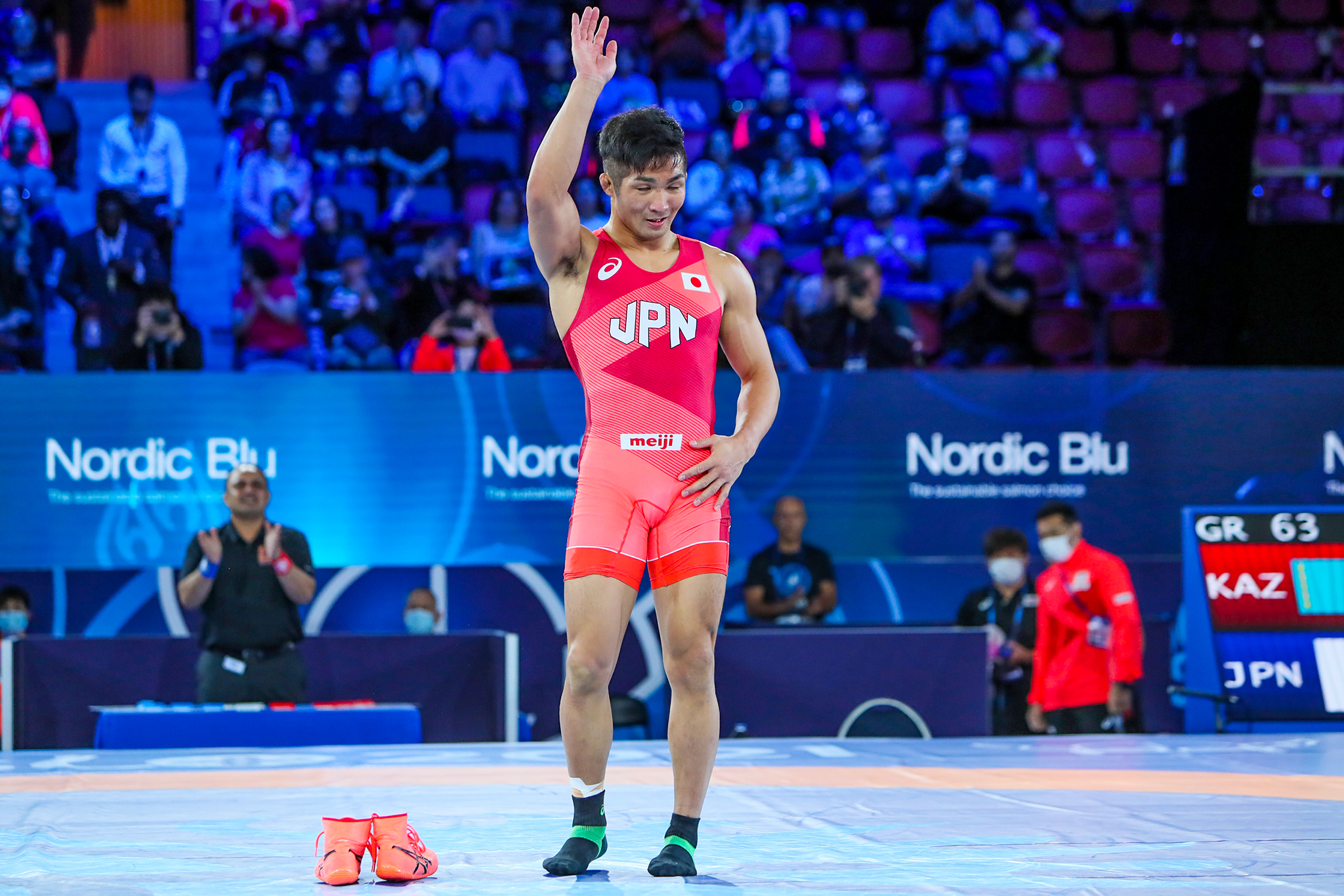 Tsuchika SHIMOYAMADA (AUS) had left his shoes on the mat during the 2021 World Championships to mark his retirement. (Photo: United World Wrestling / Martin Gabor)
Tsuchika SHIMOYAMADA (AUS) had left his shoes on the mat during the 2021 World Championships to mark his retirement. (Photo: United World Wrestling / Martin Gabor)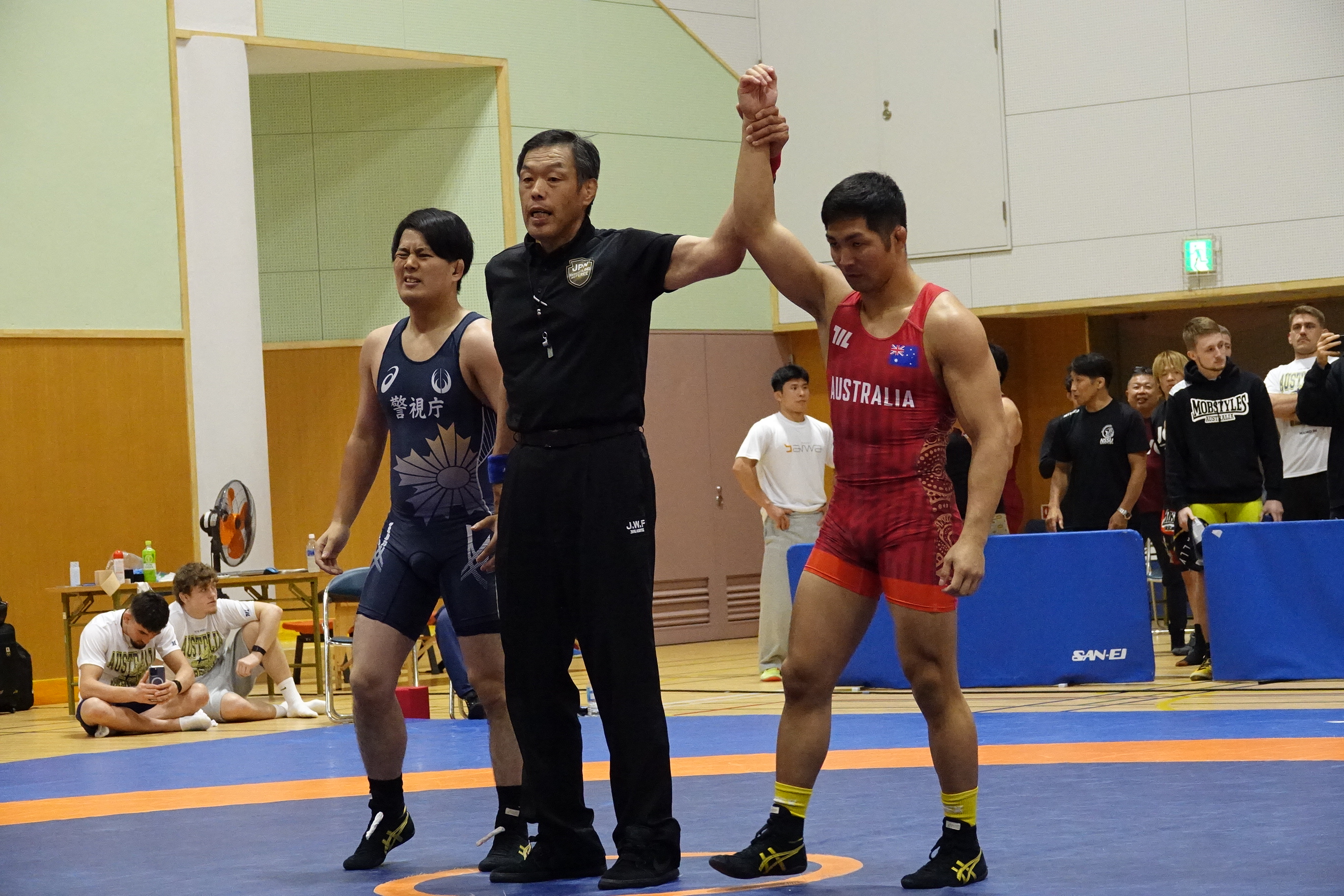 Tsuchika SHIMOYAMADA advances to the semifinals at the All-Japan Non-Student Championships in July with a 52-second win over Kokoro GOTO. (Photo: Koji Fuse / wrestling-spirits.jp)
Tsuchika SHIMOYAMADA advances to the semifinals at the All-Japan Non-Student Championships in July with a 52-second win over Kokoro GOTO. (Photo: Koji Fuse / wrestling-spirits.jp)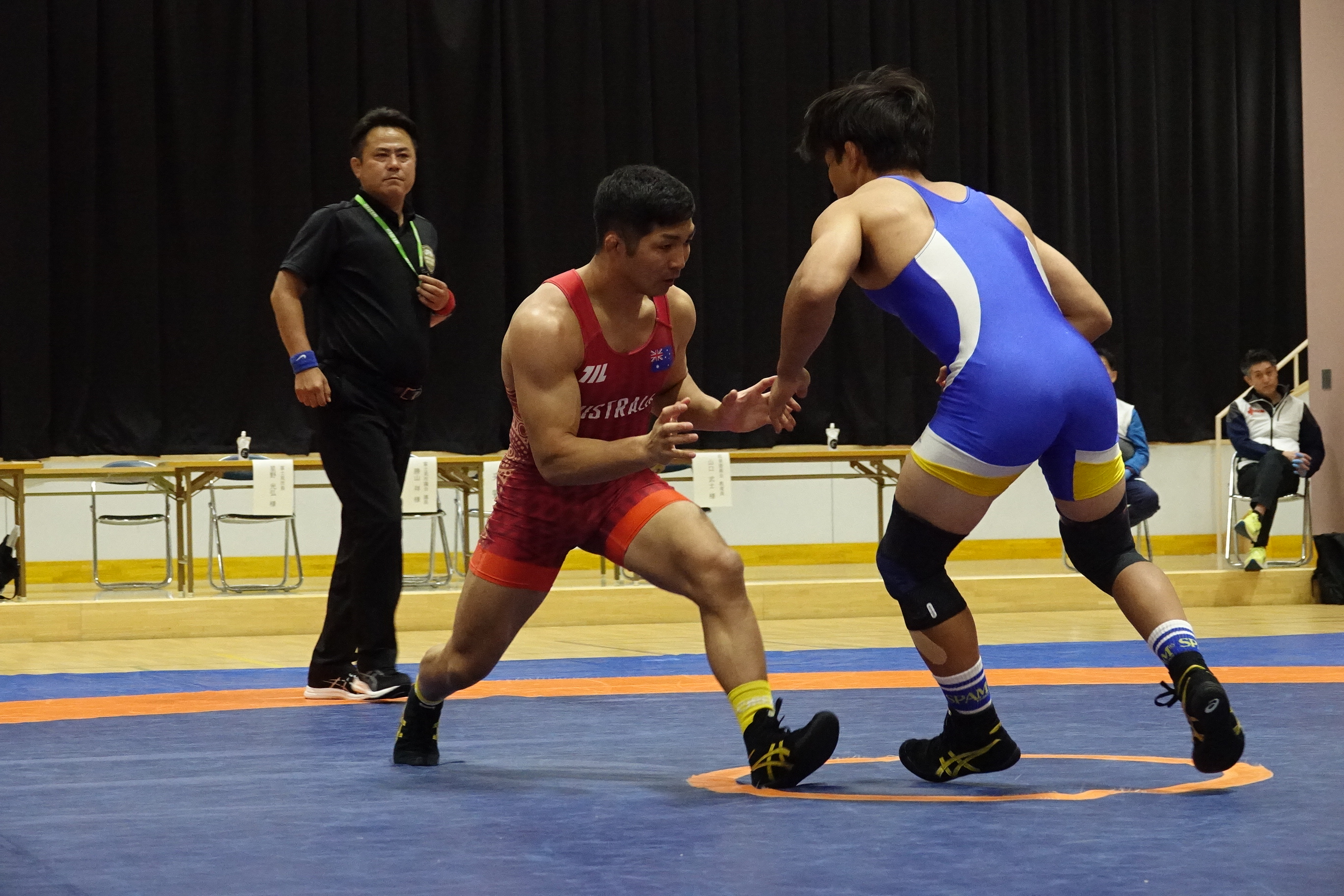 Tsuchika SHIMOYAMA faces Keitaro ONO in his opening match at the All-Japan Non-Student Championships in July. (Photo: Koji Fuse / wrestling-spirits.jp)
Tsuchika SHIMOYAMA faces Keitaro ONO in his opening match at the All-Japan Non-Student Championships in July. (Photo: Koji Fuse / wrestling-spirits.jp)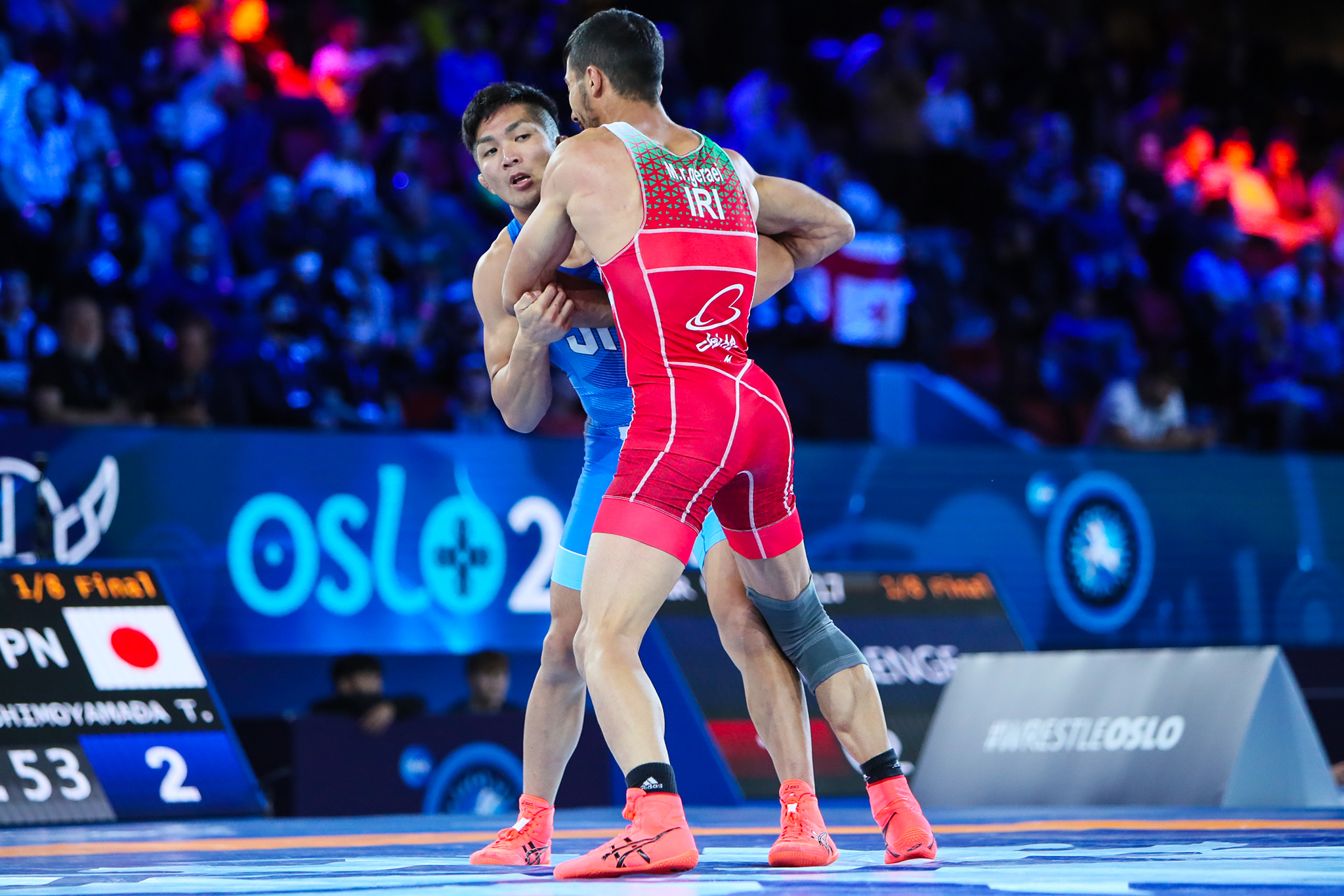 Tsuchika SHIMOYAMADA (AUS) was dominating Mohammadreza GERAEI (IRI) in their match at the 2021 World Championships before being pinned. (Photo: United World Wrestling / Martin Gabor)
Tsuchika SHIMOYAMADA (AUS) was dominating Mohammadreza GERAEI (IRI) in their match at the 2021 World Championships before being pinned. (Photo: United World Wrestling / Martin Gabor)
Share your thoughts.
Comments